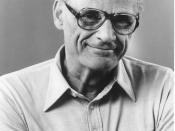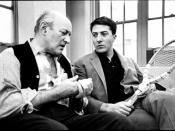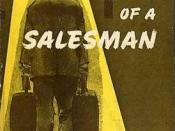Death of a Salesman: In the play, Arthur Miller's Death of a Salesman: Willy Loman, a sympathetic salesman and despicable father who's "life is a casting off" has some traits that match Aristotle's views of a tragic hero. Willy's series of "ups and downs" is identical to Aristole's views of proper tragic figure; a king with flaws. His faulty personality, the financial struggles, and his inabiltity are three substantital flaws that contribute to his failure and tragic end. Willy, an aging salesman who sells nothing, is abused by the buyers, and repeatly borrows money from Charley to make ends meet. He is angered by the way his boss, Howard fired him after working for thirty-four-years at the same company, "You can't eat the orange and throw the peel away--a man is not a piece of fruit!" (Miller, 61). Willy is battling for his life, fighting to sustain a sense of himself that makes it worthwhile living at all in a world which seemingly offers less and less space for the individual.
Now, If it is true that tragedy is the consquence of a man's total complusion to evaluate himself justly, his destruction in the attempt posits a wrong or an evil in his environment. And this is precisely the morality of tragedy and its lesson. The discovery of the moral law, which is what the enlightenment of tragedy consists of, is not the discovery of some abstract or metaphysical quantity. (miller, common man) His problem is that he has so completely accepted the values of his society that he judges himself by standards rooted in social myths rather than human necessities. This lack of insight is strikingly similiar to traits of the tragic hero. As Aristotle's writes, the tragic hero, "Lives for honor and fame". The glaring point of...



Nicely written play
That play is nicely written. I think that u should get a very nice grade on that.
1 out of 1 people found this comment useful.